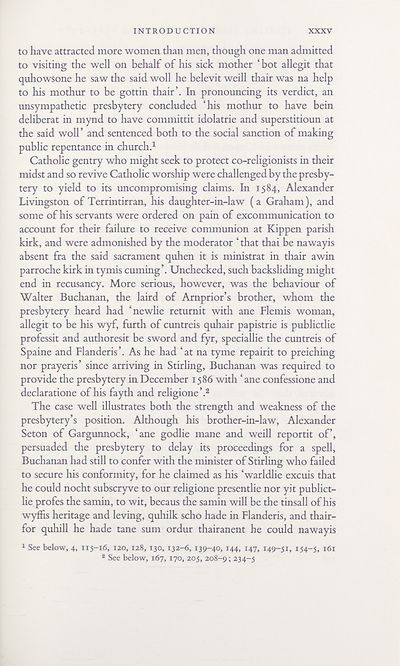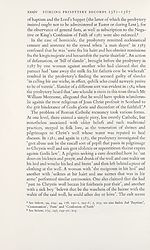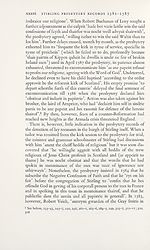Series 4 > Stirling Presbytery Records 1581-1587
(40) Page xxxv
Download files
Complete book:
Individual page:
Thumbnail gallery: Grid view | List view

INTRODUCTION
XXXV
to have attracted more women than men, though one man admitted
to visiting the well on behalf of his sick mother ‘ hot allegit that
quhowsone he saw the said woll he belevit weill thair was na help
to his mothur to be gottin thair’. In pronouncing its verdict, an
unsympathetic presbytery concluded ‘his mothur to have bein
deliberat in mynd to have committit idolatrie and superstitioun at
the said woll’ and sentenced both to the social sanction of making
public repentance in church.1
Catholic gentry who might seek to protect co-religionists in their
midst and so revive Catholic worship were challenged by the presby¬
tery to yield to its uncompromising claims. In 1584, Alexander
Livingston of Terrintirran, his daughter-in-law (a Graham), and
some of his servants were ordered on pain of excommunication to
account for their failure to receive communion at Kippen parish
kirk, and were admonished by the moderator ‘ that thai be nawayis
absent fra the said sacrament quhen it is ministrat in thair awin
parroche kirk in tymis cuming’. Unchecked, such backsliding might
end in recusancy. More serious, however, was the behaviour of
Walter Buchanan, the laird of Arnprior’s brother, whom the
presbytery heard had ‘newlie retumit with ane Flemis woman,
allegit to be his wyf, furth of cuntreis quhair papistrie is publictlie
professit and authoresit be sword and fyr, speciallie the cuntreis of
Spaine and Flanderis’. As he had ‘at na tyme repairit to preiching
nor prayeris’ since arriving in Stirling, Buchanan was required to
provide the presbytery in December 1586 with ‘ane confessione and
declaratione of his fayth and religione’.2
The case well illustrates both the strength and weakness of the
presbytery’s position. Although his brother-in-law, Alexander
Seton of Gargunnock, ‘ane godlie mane and weill reportit of’,
persuaded the presbytery to delay its proceedings for a spell,
Buchanan had still to confer with the minister of Stirling who failed
to secure his conformity, for he claimed as his ‘warldlie excuis that
he could nocht subscryve to our religione presentlie nor yit publict¬
lie profes the samin, to wit, becaus the samin will be the tinsall of his
wyffis heritage and leving, quhilk scho hade in Flanderis, and thair-
for quhill he hade tane sum ordur thairanent he could nawayis
1 See below, 4, 115-16, 120, 128, 130, 132-6, 139-40, 144, 147, 149-51, 154-5, 161
2 See below, 167, 170, 205, 208-9; 234-5
XXXV
to have attracted more women than men, though one man admitted
to visiting the well on behalf of his sick mother ‘ hot allegit that
quhowsone he saw the said woll he belevit weill thair was na help
to his mothur to be gottin thair’. In pronouncing its verdict, an
unsympathetic presbytery concluded ‘his mothur to have bein
deliberat in mynd to have committit idolatrie and superstitioun at
the said woll’ and sentenced both to the social sanction of making
public repentance in church.1
Catholic gentry who might seek to protect co-religionists in their
midst and so revive Catholic worship were challenged by the presby¬
tery to yield to its uncompromising claims. In 1584, Alexander
Livingston of Terrintirran, his daughter-in-law (a Graham), and
some of his servants were ordered on pain of excommunication to
account for their failure to receive communion at Kippen parish
kirk, and were admonished by the moderator ‘ that thai be nawayis
absent fra the said sacrament quhen it is ministrat in thair awin
parroche kirk in tymis cuming’. Unchecked, such backsliding might
end in recusancy. More serious, however, was the behaviour of
Walter Buchanan, the laird of Arnprior’s brother, whom the
presbytery heard had ‘newlie retumit with ane Flemis woman,
allegit to be his wyf, furth of cuntreis quhair papistrie is publictlie
professit and authoresit be sword and fyr, speciallie the cuntreis of
Spaine and Flanderis’. As he had ‘at na tyme repairit to preiching
nor prayeris’ since arriving in Stirling, Buchanan was required to
provide the presbytery in December 1586 with ‘ane confessione and
declaratione of his fayth and religione’.2
The case well illustrates both the strength and weakness of the
presbytery’s position. Although his brother-in-law, Alexander
Seton of Gargunnock, ‘ane godlie mane and weill reportit of’,
persuaded the presbytery to delay its proceedings for a spell,
Buchanan had still to confer with the minister of Stirling who failed
to secure his conformity, for he claimed as his ‘warldlie excuis that
he could nocht subscryve to our religione presentlie nor yit publict¬
lie profes the samin, to wit, becaus the samin will be the tinsall of his
wyffis heritage and leving, quhilk scho hade in Flanderis, and thair-
for quhill he hade tane sum ordur thairanent he could nawayis
1 See below, 4, 115-16, 120, 128, 130, 132-6, 139-40, 144, 147, 149-51, 154-5, 161
2 See below, 167, 170, 205, 208-9; 234-5
Set display mode to:
![]() Universal Viewer |
Universal Viewer | ![]() Mirador |
Large image | Transcription
Mirador |
Large image | Transcription
Images and transcriptions on this page, including medium image downloads, may be used under the Creative Commons Attribution 4.0 International Licence unless otherwise stated. ![]()
| Scottish History Society volumes > Series 4 > Stirling Presbytery Records 1581-1587 > (40) Page xxxv |
|---|
| Permanent URL | https://digital.nls.uk/126646635 |
|---|
| Description | Over 180 volumes, published by the Scottish History Society, containing original sources on Scotland's history and people. With a wide range of subjects, the books collectively cover all periods from the 12th to 20th centuries, and reflect changing trends in Scottish history. Sources are accompanied by scholarly interpretation, references and bibliographies. Volumes are usually published annually, and more digitised volumes will be added as they become available. |
|---|


